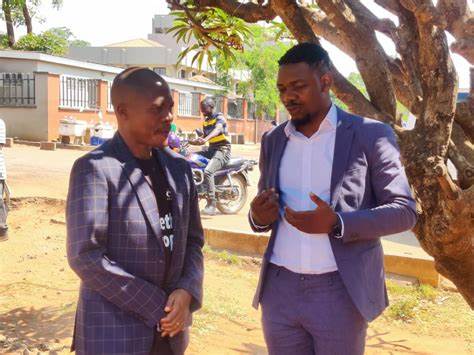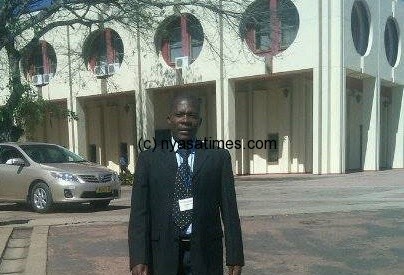On Thursday, June 26, Silvester Namiwa, the lead figure of Citizens for Credible Elections, faced a shocking reality: when you burn bridges, don’t expect to find support on the other side.
What was intended to be a grand, countrywide anti-government demonstration ended in scattered turnouts, public backlash, and, in Namiwa’s case, a bruising beatdown by vendors and traders in Lilongwe eager to protect their businesses.
The message was clear: Malawians are tired of being used, especially by activists who claim to be fighting for the people but are serving hidden masters and personal interests.
The most striking outcome was the conspicuous absence of fellow civil society leaders and even key political figures who normally risk it either for genuine support to the cause or for personal optics did not show any solidarity.
Prominent names that would normally rally around issues of national concern were missing. Not because they don’t care, but because many have seen through the true motivations of Namiwa and his backers.
For UTM leader Dr. Dalitso Kabambe he only appeared in the evening to offer solidarity through a press conference. If he really believed in this fight, why did he not join Namiwa in the streets?
This is loud enough. The demos were not about democracy or accountability, they were about power, control, and likely, paychecks.

Namiwa with Kajoloweka, some of the faces that could have been at the demonstrations but they were absent
Namiwa found himself standing almost alone, deserted. While he may have expected solidarity from traditional allies, none came. Bon Kalindo? Silent. His new buddy Edward Kambanje? Distant. The fighters of old like Charles Kajoloweka and John Kapito? Absent.
We have had people like Gift Trapence and Timothy Mtambo who once rallied tens of thousands to the streets and had support from fellow civil society community without throwing a single kwacha to participants. Their cause was genuine, their conviction real. But on June 26, those who have walked the trenches of real struggle stayed away, and for good reason.
Many in civil society circles have expressed privately that Namiwa’s confrontational style, questionable alliances, and personal political ambition have made him a toxic figure.
In Blantyre, the demonstrations passed quietly, perhaps due to the DPP’s strong roots in the Southern Region and the organizers were eager to protect their business interests in the city, or perhaps because the people there, too, are tired but less eager to confront the likes of Namiwa publicly.
But in Lilongwe and Mzuzu, the scenes were vastly different. Property owners and vendors, who bore the brunt of destruction in past protests, were not ready to let opportunists disturb their peace and ruin business again.
Traders in Lilongwe physically confronted Namiwa, demanding to know why he was putting their livelihoods at risk.
That he was the only person attacked during the protests speaks volumes. He was seen not as a leader, but as an instigator. It wasn’t the government. It wasn’t the police. It was ordinary people saying enough is enough.
In Mzuzu, leaders from the Northern Region who could have been there in solidarity, including Khumbo Kachali, Frank Mwenifumbo, and Victor Madhlopa, also distanced themselves from the demonstrations.
They recently declared their region will no longer be used as a political battleground for causes they did not help shape. For the North, the DPP and its allies have always used Mzuzu as a testing ground, a place to incite unrest without delivering any lasting solutions. The people are fed up.

Namiwa at State House when he served as Press Officer for President Arthur Peter Mutharika: A fight for a come back into the corridors of power
Contrast This With the 2019-2020 Demonstrations
To understand just how far off-course these demonstrations were, one needs to look back to 2019–2020, when the Human Rights Defenders Coalition (HRDC) led by Mtambo and Trapence organized mass nationwide protests following the tippex-rigged 2019 elections.
The passion then was palpable. Students, religious groups, politicians, vendors, and CSOs marched side-by-side, driven not by cash but by conviction.
There were no handouts, no bankrolled logistics from political parties, and no heavy-handed manipulation.
People showed up because they believed Malawi deserved better. The momentum was organic.
In contrast, this week’s demonstrations reeked of political orchestration. Rumors of DPP backing through Nawiwa’s networks, suspicious transport arrangements, and the lack of grassroots involvement have painted a clear picture: this was a rented crowd movement.
There’s a Chichewa saying that goes:“Wokukonda sadzakugulitsa ngakhale uli ndi mtengo waukulu” (Someone who loves you won’t sell you out even if your price is high). Malawians must take this to heart. Being used by opportunists, be they politicians or so-called activists, is a betrayal of one’s own dignity.
The public must demand transparency, both from government and from those claiming to fight it.
Who funds the demonstrations? What are the real motives? Are the people involved working for national good or personal gain? These questions must be asked, and answered, before lending support.
We have seen before how political parties use protests to test the waters of power, to divert attention from their failures, or to pave the way for returning old guards.
The DPP’s shadow looms large behind Namiwa, and the events of June 26 only further confirm that what paraded itself as civil action was in fact political theatre.
Perhaps the most unfairly treated in all this are the police. Weeks before the protests, Namiwa verbally attacked the Police Inspector General Merlyn Yolamu during a CSO interface meeting, claiming she was unfit to lead the service. The reason? Her gender. In Namiwa’s own words simply because she is a woman.
The insult was not only sexist, it was hypocritical.
On Thursday, when things went south and violence erupted in Lilongwe with vendors began chasing him, Namiwa expected the same police, whose overall boss he embarrassed publicly, to protect him. The irony couldn’t have been sharper.
He called for the same police force he maligned to rescue him from an angry crowd.
This was no ordinary crowd. It was not an orchestrated political attack. It was ordinary business people and vendors who had reached their limit with being collateral damage in other people’s agendas.
The police had to act fast, exercise restraint, and make sure the situation did not escalate. Teargas was fired, not at innocent bystanders, but to disperse chaos. And in the middle of it, Namiwa was pulled to safety, by the very service he insulted.
It is galling that some media outlets even tried to suggest that police “just watched.” Photos and video footage contradict this. Police officers were clearly involved in crowd control and protecting the protestors, even the ones who had ridiculed them days earlier.
Lessons for Namiwa and Others
Gone are the days when Malawians could be used blindly in power games. The people are watching. The people are learning. The people are tired. Tired of being pawns. Tired of violence dressed as resistance. Tired of wolves in activist clothing.
The events of June 26 should be a wakeup call, not just for Namiwa, but for all who think activism is a shortcut to power.
True change is built on trust, empathy, and humility. Without these, all you’ll get is a bruised face and an empty street.
For Namiwa, hear this: Leadership is not about noise. It is not about always pointing fingers. It is not about being confrontational for the sake of relevance. You must take a leaf from the Trapence and Mtambo school of activism, where planning, timing, community engagement, and moral clarity are the driving principles.
Had the concerns raised in these demonstrations been anchored in public dialogue, real grievances, and collective leadership, things might have turned out differently. But when one man becomes the face, the funder, and the supposed beneficiary, the public rightfully becomes suspicious.
They ask: is this about Malawi, or about one man’s career?








